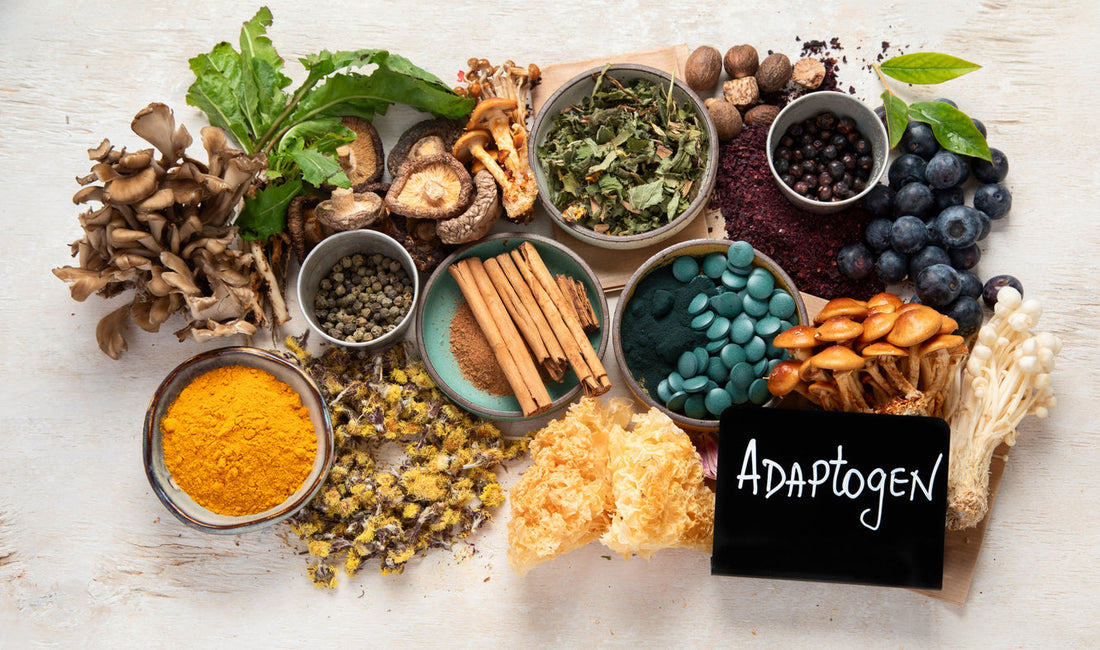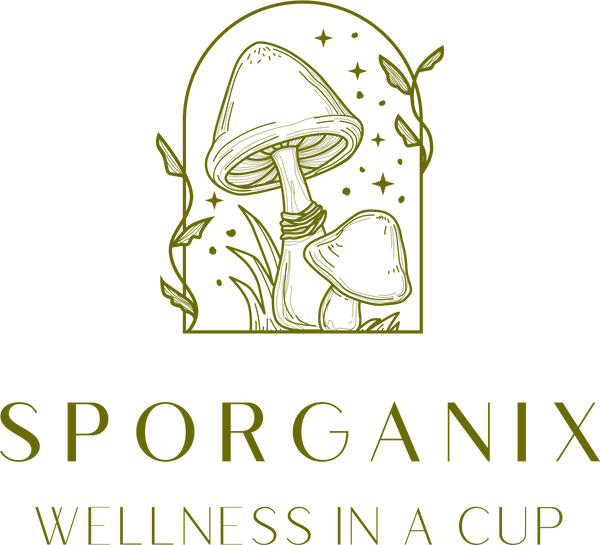
6 Functional Mushrooms Backed by 2025 Science
Share
Functional mushrooms have taken the wellness world by storm, but in 2025, we're no longer relying on hype or tradition alone. From cognitive support to immune modulation and cellular protection, modern science is catching up with what ancient medicine has known for centuries. This article dives deep into the most recent peer-reviewed research on the top non-psychedelic functional mushrooms—exploring how they work, what they can (and can't) do, and why they may become a cornerstone of your health regimen. In this article, we examine 6 functional mushrooms backed by 2025 science and the latest clinical data on their health benefits.
What Are the 6 Functional Mushrooms Covered in 2025 Research?
Functional mushrooms are species of fungi known for providing health benefits beyond basic nutrition. Unlike psychedelic mushrooms, these varieties do not alter consciousness. Instead, they contain bioactive compounds—like beta-glucans, terpenoids, antioxidants, and polysaccharides—that support immune function, brain health, energy metabolism, and more.
Popular examples include:
-
Lion’s Mane (Hericium erinaceus)
-
Reishi (Ganoderma lucidum)
-
Cordyceps (Cordyceps militaris/sinensis)
-
Chaga (Inonotus obliquus)
-
Turkey Tail (Trametes versicolor)
-
Shiitake (Lentinula edodes)
These mushrooms have been used in Traditional Chinese Medicine, Ayurveda, and Japanese Kampo medicine for centuries. Now, clinical trials and laboratory studies are beginning to validate their effects in the language of modern biochemistry.
Functional mushrooms are not a silver bullet. But when used consistently—especially in well-sourced extracts—they can become a powerful component of a daily health stack that emphasizes prevention, resilience, and longevity.
Lion’s Mane: The Cognitive Catalyst
Lion’s Mane is best known for its effect on the brain. It contains hericenones and erinacines—compounds shown to stimulate nerve growth factor (NGF) production. NGF is a protein essential for the survival and regeneration of neurons.
Highlights from 2025 Research:
-
A 16-week study on adults aged 50–80 demonstrated measurable improvements in memory recall and focus with daily supplementation of 1g Lion’s Mane extract (NOVOS Labs, 2025).
-
In vitro and animal studies continue to show enhanced neurogenesis and myelination—critical for cognitive resilience and brain plasticity.
-
Early results suggest possible protection against Alzheimer’s-related beta-amyloid plaque formation, though human trials are ongoing.
-
A 2025 Korean study found that combining Lion’s Mane with B-vitamins improved verbal memory more significantly than either intervention alone.
Mechanism of Action:
Lion’s Mane appears to cross the blood-brain barrier, where it activates NGF-related pathways that enhance synaptic connectivity, axonal growth, and even remyelination in damaged nerves.
Bottom line: Lion’s Mane is one of the most promising natural compounds for long-term brain health, particularly for individuals concerned about cognitive decline, burnout, or memory fog.
Reishi: The Immune and Adaptogen Master
Reishi is often referred to as the "mushroom of immortality" in ancient texts—and for good reason. Its complex array of beta-glucans, ganoderic acids, and polysaccharides influence immune signaling, inflammation response, and stress adaptation.
2025 Findings:
-
Studies confirmed that Reishi extract modulates cytokine production, reducing overactive inflammatory responses common in autoimmune conditions (Utah Health Sciences, 2025).
-
Reishi has been shown to lower serum cortisol levels in stressed subjects by over 20% on average (Banner Health Adaptogen Study).
-
Clinical use in oncology as an immunomodulatory adjunct continues to expand, particularly for breast and lung cancer patients receiving chemotherapy.
-
An animal trial published in April 2025 showed that Reishi improved insulin sensitivity and lowered fasting glucose in prediabetic rats.
Additional Benefits:
Reishi also promotes deep sleep, partially by balancing GABA receptors and influencing circadian rhythm signaling. Anecdotal reports and small-scale trials report reductions in nighttime awakenings and subjective improvements in sleep quality.
Conclusion: Reishi excels at helping the body regulate itself under chronic stress, immune imbalance, and metabolic strain.
Cordyceps: Energy, Stamina, and Mitochondrial Power
Cordyceps is often associated with increased stamina, libido, and athletic performance. This is largely attributed to its ability to enhance adenosine triphosphate (ATP) production in the mitochondria—the energy currency of our cells.
Research Highlights:
-
A placebo-controlled study in mid-2025 showed a 12% improvement in VO2 max in amateur athletes over an 8-week Cordyceps regimen (Journal of Sports Nutrition & Endocrinology).
-
Cordycepin, a major bioactive compound, shows promising anti-inflammatory and anti-tumor properties in vitro.
-
Libido-boosting effects were confirmed in small human studies measuring testosterone levels and sperm motility.
-
A study in mice demonstrated that Cordyceps supplementation increased time to fatigue by 27% on treadmill tests.
Mechanism:
Cordyceps increases the availability of adenosine, which widens blood vessels and improves oxygen delivery. It also enhances AMPK activation, improving glucose uptake in muscle tissue.
Key takeaway: Cordyceps supports physical endurance, mitochondrial efficiency, sexual health, and vitality—making it a favorite among biohackers and athletes alike.
Chaga: The Antioxidant Alchemist
Chaga is a birch-dwelling mushroom with one of the highest known ORAC (oxygen radical absorbance capacity) scores of any natural substance. It's rich in polyphenols, melanin, and betulinic acid—all known for their antioxidant and anti-inflammatory potential.
2025 Data:
-
A review of over 30 studies found consistent reductions in oxidative stress biomarkers, particularly in individuals with gut inflammation and IBS (Nutraceutical Science Weekly).
-
Betulinic acid has shown strong activity against free radical damage in liver and skin cells, making Chaga a candidate for anti-aging support.
-
Chaga also promotes gut microbiome diversity due to its prebiotic fiber content.
-
An in vitro study demonstrated Chaga’s ability to inhibit lipid peroxidation by up to 61%, indicating potential for cardiovascular health applications.
Immune & Liver Support:
Chaga polysaccharides have been shown to activate macrophages and support liver detox pathways. Some researchers now consider it an immune-prebiotic hybrid, due to its gut-liver-immunity axis activity.
Summary: Chaga is a powerhouse for combating cellular stress and promoting gut-liver-skin axis health—and may offer promising support for longevity, detox, and inflammation control.
Turkey Tail: Gut-Immune Synergy in Action
Turkey Tail contains potent polysaccharopeptides (PSK and PSP) that interact with immune cells and gut bacteria alike. It's one of the most researched mushrooms in oncology support settings.
Recent Advances:
-
PSK is approved in Japan as an immunotherapy adjunct for gastric and colorectal cancer. A 2025 update reaffirmed its ability to enhance natural killer (NK) cell activity.
-
Turkey Tail also enhances SCFA (short-chain fatty acid) production in the gut, which helps regulate inflammation and supports gut barrier integrity.
-
Its combination of immune support + gut modulation makes it a unique “dual-action” mushroom.
-
A human trial in 2025 showed that daily Turkey Tail supplementation improved post-antibiotic microbiome recovery by 34% compared to placebo.
Mechanism:
The polysaccharides in Turkey Tail act as prebiotics, feeding beneficial bacteria like Akkermansia and Bifidobacteria. Simultaneously, its beta-glucans stimulate dendritic cells and NK cells.
Use case: Ideal for those seeking support during illness recovery, leaky gut issues, or as an adjunct to medical treatment (with doctor guidance).
Shiitake: The Cardiovascular Guardian
Beyond its rich umami flavor, Shiitake contains compounds like eritadenine and lentinan that support cardiovascular and immune health.
Research Notes:
-
Eritadenine has demonstrated consistent effects in lowering serum cholesterol and triglycerides in both animals and humans.
-
Lentinan shows immune-boosting effects similar to those of Turkey Tail PSP.
-
Shiitake also enhances skin barrier function, potentially aiding those with eczema and psoriasis.
-
A 2025 trial reported that combining Shiitake with Omega-3 supplements led to a synergistic drop in LDL cholesterol and systemic inflammation.
Skin & Anti-Aging:
Lentinan may support collagen integrity and inhibit matrix metalloproteinases—enzymes that degrade skin structure in aging.
Best for: Individuals interested in heart health, immune resilience, and skin immunity.
Choosing the Right Mushroom Supplement
Not all mushroom products are created equal. Here’s what 2025 experts suggest checking:
-
Fruiting Body vs Mycelium: Fruiting body extracts generally contain more active compounds.
-
Dual Extraction: Alcohol + hot water extraction ensures full-spectrum bioavailability.
-
Beta-Glucan Percentage: Look for products that disclose beta-glucan content, not just polysaccharides.
-
Organic and Third-Party Tested: Avoid fillers, grains, or contaminated materials.
-
Synergistic Blends: Some effects may be enhanced when mushrooms are combined with adaptogens like ashwagandha or Rhodiola.
Also, keep in mind that daily use over time (not one-off dosing) is usually required for full benefit.
Final Thoughts: The Fungus Is Future
Functional mushrooms aren’t magic—but they are deeply biologically active, and 2025 research is finally catching up to their ancient reputation. From cognitive restoration to energy support, gut repair, and immune balance, these mushrooms are earning their place in the modern supplement stack.
The convergence of traditional medicine, biotechnology, and clinical research is unlocking a new phase in preventative and functional health. As the market shifts toward evidence-based wellness, mushrooms offer a unique bridge between ancient wisdom and cutting-edge science.
Whether you’re looking to sharpen your focus, support your gut, calm your stress response, or just add another tool to your longevity toolkit—there’s likely a mushroom (or a stack of them) waiting for you.

Sources:
-
NOVOS Labs. (2025). Mushrooms for Longevity
-
Utah Health Sciences. (2025). Functional Mushroom Review
-
Banner Health. (2025). Adaptogens & Stress Response
-
Nutraceutical Science Weekly. (2025). Chaga and Oxidative Stress
-
Journal of Sports Nutrition & Endocrinology. (2025). Cordyceps Performance Trials
-
Nutraceutical Business Review. (2025). Biotech Partnerships in Fungi-Based Therapeutics
-
Journal of Clinical Nutrition & Microbiome. (2025). Turkey Tail & Microbiota Recovery
-
Korean Institute of Integrative Neuroscience. (2025). Lion's Mane and B-vitamin Synergy Study
-
MycoMedicine Journal. (2025). Reishi, Sleep, and Immune Pathways
